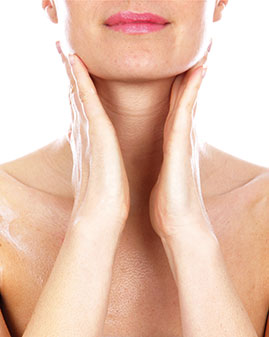
Rude Looks
It’s personal
We use toiletries every day and yet many of us don’t stop to think about their harmful ingredients. Now there is a natural alternative to every product in a health store near you
What’s in your toiletries?
Laura Downes, Nutritional Advisor at Carmel’s Health Store in Ennis, Co Clare: “Many conventional shampoos, toothpastes, deodorants, fake tans, perfumes and hair dyes contain health-threatening chemicals such as fluoride, sodium lauryl sulphates and parabens. Inside these toiletries lurks a cocktail of dangerous synthetic chemicals.”
Madeleine Graham of Natracare who make natural personal care products: “Conventional sanitary pads are mostly made from up to 90% petroleum-derived plastic materials such as polyethylene (the stuff of plastic shopping bags), polypropylene, a synthetic cloth-like material, dyes, and often stuffed full with super absorbent gel. The aggressively absorbent, bleached and synthetic materials used in conventional pads and panty liners can create skin conditions such as itching and soreness. Conventional tampons are usually made from chlorine-bleached, aggressively absorbent rayon, perhaps blended with a small percentage of conventionally-grown cotton, loosely cased in polypropylene to try to stop the rayon fibres shedding during use. There’s even the added possibility of containing fragrances, lubricants, and dyes.”
Why is natural different?
Laura Downes: “Many manufacturers of toiletries and personal care products offer a full range that are formulated from natural extracts of solvent-free oils such as coconut, rose hip, jojoba, shea butter and aloe vera. Natural products assist in balancing the skin’s natural oils, leaving it soft and nourished.”
Madeleine Graham: “Certified organic and natural, biodegradable personal care products are one easy way of reducing our exposure to pesticides and potentially harmful chemical residues and reducing our environmental impact.”
What’s available?
Laura Downes: “There is a broad range of natural toiletries and personal care products available in health stores. These range from hair care products which include shampoos, conditioners, hair dyes and intensive treatments, to face and body moisturisers. Then there are personal hygiene products such as toothpastes, deodorants, soaps and feminine wipes and washes. For men there are specialised ranges which include body washes, moisturisers, shaving lotions and oils.”
Other ingredients used in natural make-up may include natural oils, butters and kaolin clay to help achieve the desired consistency, texture and staying power.
You can buy certified organic and natural sanitary products including 100% organic cotton tampons and biodegradable pads and panty-liners.
The role of essentials
Laura Downes: “Essential oils such as lavender and tea tree are sold in all health stores and are a must in every bathroom cupboard. They can be added to baths, showers, creams and base oils for massage. They have healing and soothing properties for all skin types.”
Odour control
According to Thomas Laird, MD of Crystal Spring who make natural crystal deodorants, “Increased body odour is a common side-effect of the menopause and requires a gentle, kind response. Unlike traditional antiperspirants, natural deodorants do not use synthetic ingredients like aluminium chlorohydrate to ‘plug’ the skin’s pores, but instead leave a thin layer of odour-inhibiting mineral salts on the skin which provide long-lasting protection but do not artificially impede one of the body’s key physiological processes – sweat formation.
Perspiration is an important method by which the body expels toxins, in addition to helping keep us cool. By using traditional antiperspirants, we hinder our body’s ability to regulate its temperature, which in turn can potentially aggravate typical menopausal symptoms such as hot flushes, heat surges and skin rashes.”
Feminine care
Laura Downes: “Chemical-free intimate feminine personal care products include sanitary towels, panty liners and tampons.”
Madeleine Graham: ”Feminine hygiene products are purchased on a monthly basis by women of all ages. Yet, despite our huge need for them they can be full of all sorts of ingredients we shouldn’t be putting on our skin. It isn’t just a health issue. We also need to think about the impact that the products we use every day have on the environment. Conventional pads and panty-liners are often made with plastics from crude oil and the billions that get thrown away every year take up vast quantities of space in landfill, where they will remain for a very, very long time.”
It’s a sobering thought that on average a woman will use 1,000 throwaway tampons during her life. For those women who want to be really green there’s the Mooncup, a menstrual cup that is worn internally and designed to catch your period blood. Every few hours you rinse it out and re-insert. They are sold in health stores and you only need to buy one (€29.99).
Click here to read other Rude Looks articles.
Click here to return to the Rude Health Magazine homepage.